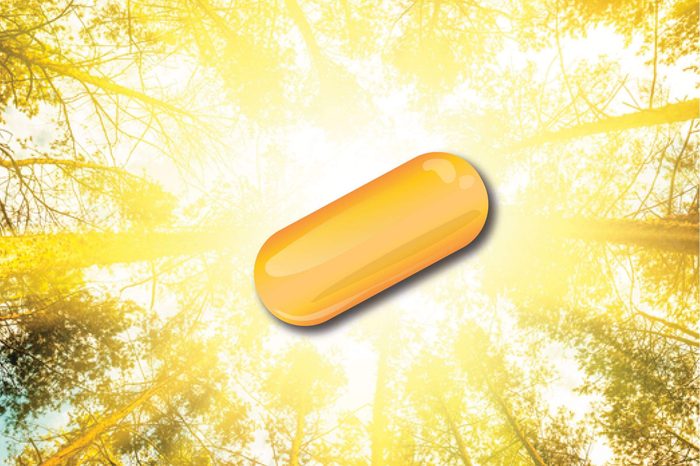
Vitamin D
According to the Mayo Clinic, how much vitamin D your skin makes depends on a few things. Some factors include the season, your skin pigmentation, the time of day, and where you live. “Depending on where you live and your lifestyle, vitamin D production might decrease or be completely absent during the winter months,” the Mayo Clinic notes. As a result, you may be vitamin D deficient. “There are a large number of receptors for vitamin D in the brain, indicating that it plays a role in cognitive function,” explains naturopathic doctor Amanda Frick, director of medical affairs for Thorne Research in South Carolina. She recommends a dose of daily sun exposure (after applying sunscreen) for at least 20 minutes each day. Or, she says you can take 2,000 IU daily of vitamin D supplements.
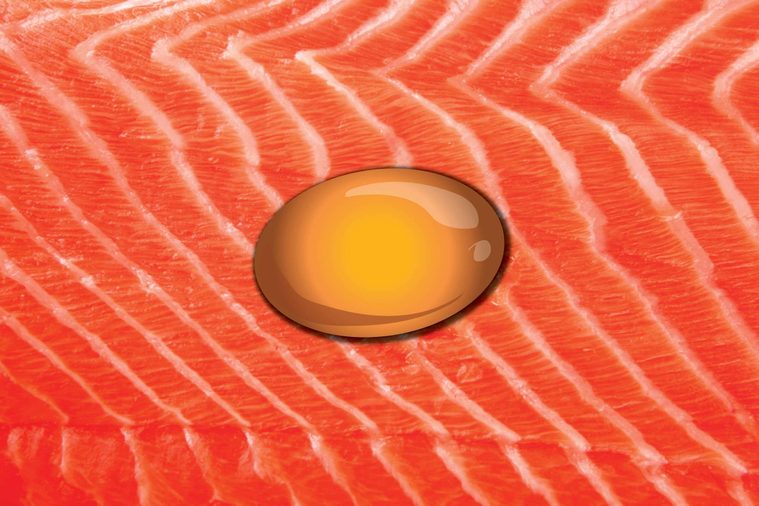
Omega 3s
Omega-3 fatty acids play an important role in brain health. They’re especially beneficial when it comes to improving symptoms of depression, cognitive functioning, and overall mood. Add more omega-3s in your diet by eating fatty fish like mackerel, salmon, and herring. It’s also in nuts and seeds like almonds, walnuts, chia seeds, and flax seeds. If eating fish isn’t your thing, fish oil pills are a great supplement. Acupuncture physician Elizabeth Trattner, who is also a certified doctor of oriental medicine and acupuncture with a private practice in Florida, suggests at least 2000 mgs of two key kinds of omega 3s: DHA and EPA. “Make sure to read labels carefully as you can have high amounts of omega 3s, but not EPA and DHA,” she says. “I like to see at least 650 mg of DHA and 1200 mg of EPA in an omega supplement.”
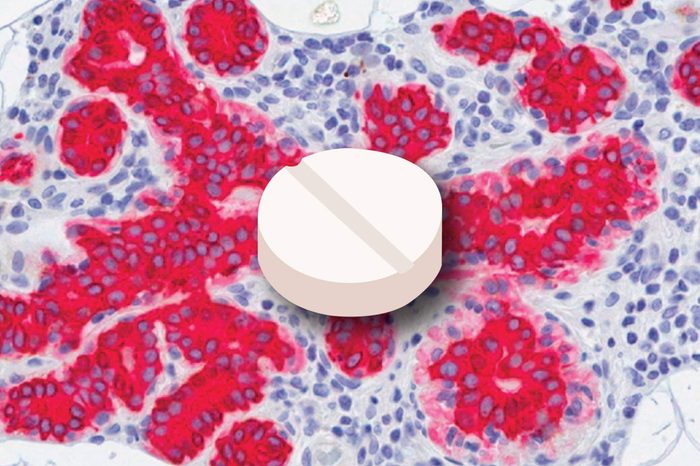
Vitamin B6
Also known as pyridoxine, vitamin B6 plays an important role in physical and psychological body functions. It’s especially vital for nerve functioning. It may also help improve some neuropsychiatric disorders like depression. “B6 is highly involved in the metabolism of estrogens, so deficiency can be highly related to PMS and hormonal imbalance depression,” explains Frick. “The birth control pill depletes B vitamins, especially B6, so supplementation is highly recommended for those taking the pill.” She recommends 25 mg daily. You may need more if you’re on the pill.
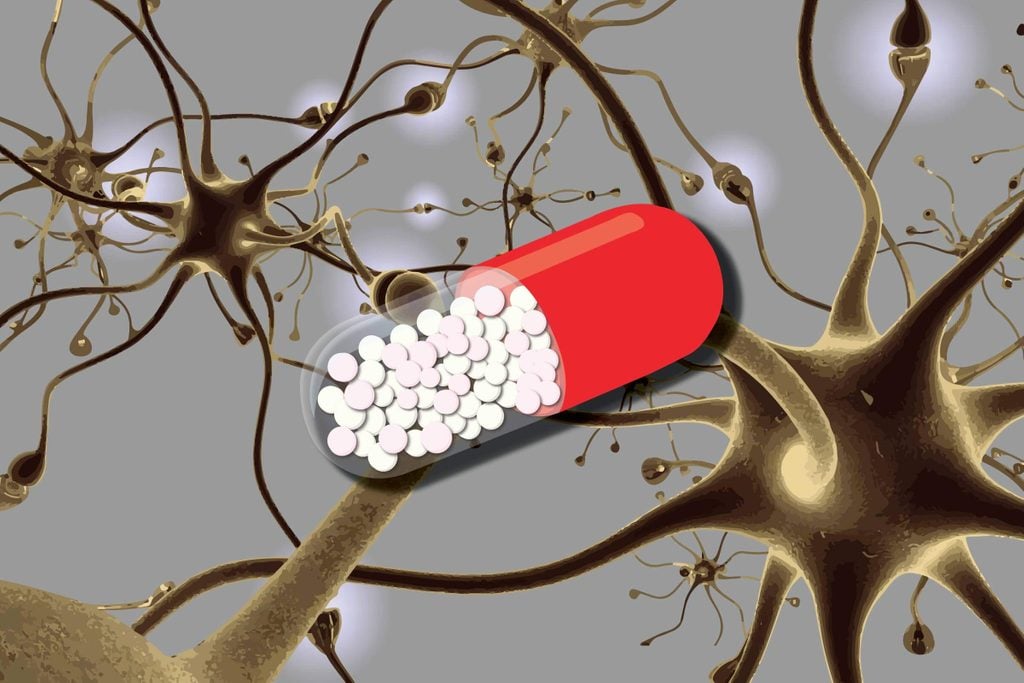
Vitamin B3
Niacin, aka vitamin B3, is involved in the production of serotonin, a neurotransmitter that enables brain cells and other nervous system cells to communicate. Too little serotonin could play a role in depression. But taking vitamin B3 may help maintain its levels. In other words, a deficiency in B3 can impair levels of serotonin and negatively impact mood. Frick recommends a dose of 20 mg daily for those dealing with depressive symptoms. However, if you have severe depression, speak to your doctor about a higher dose. “Niacin may cause flushing which some people find very uncomfortable, and may wish to use a non-flushing niacin format,” she adds. These are some natural energy boosters you that might change your life.
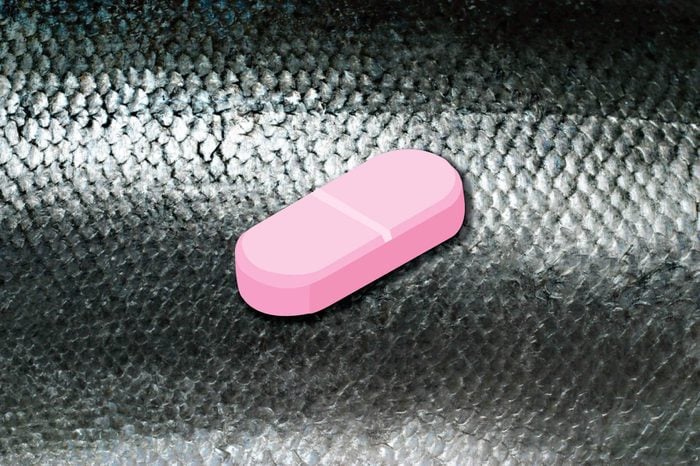
Vitamin B12
This vitamin has been known to boost mood and energy and reduce depression, explains Sally Warren, PhD, a naturopathic doctor at Metro Integrative Pharmacy in New York City. “Taking a good B-complex daily (at least 10 mg) can help with ensuring good levels are maintained,” she says. It’s especially helpful if you’re vegan or vegetarian, she adds. In terms of food sources, she says B12 is highest in beef liver, sardines, mackerel, lamb. It’s also in eggs, feta cheese, and cottage cheese.
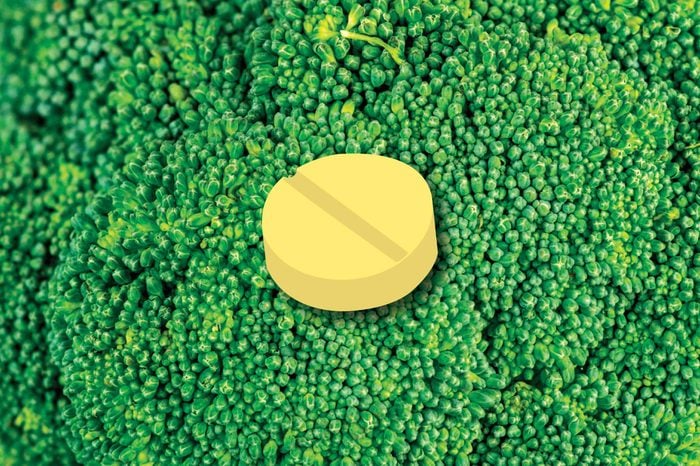
Folate
This necessary nutrient, which also goes by the name of folic acid or vitamin B9, helps the body in the creation of new cells. This is one of the reasons it’s so important for pregnant women to get their fair share. In fact, pregnant women experiencing a vitamin B9 deficiency are at risk for delivering a baby with neural tube defects such as anencephaly and spina bifida. Additionally, a deficiency can cause depression. “Folic acid can help synthesize serotonin, which is a neurotransmitter involved in mood regulation,” says Kerri Axelrod, a certified holistic health and wellness counselor and yoga instructor at Kerri Axelrod Wellness in Boston. Aim for 400 mcg per day of folic acid, which is the recommended dosage from the National Institutes of Health.
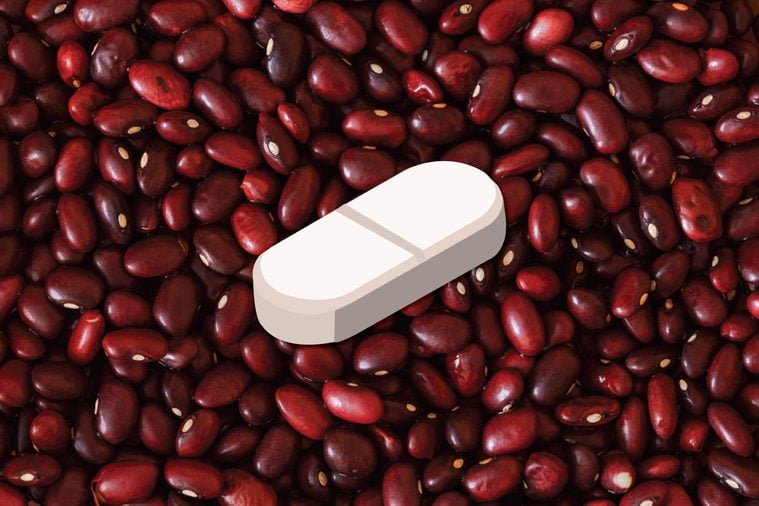
Magnesium
Magnesium helps with relaxation, muscle tension, and constipation. It also plays a key role in the productions of brain hormones, explains Trattner. According to the National Institutes of Health, magnesium-rich foods include almonds, spinach, cashews, avocado, and black beans. However, they also state that supplements can help boost low levels. Consider taking a supplement of 320 to 450 mg daily, especially at night to help with insomnia, suggests Warren.
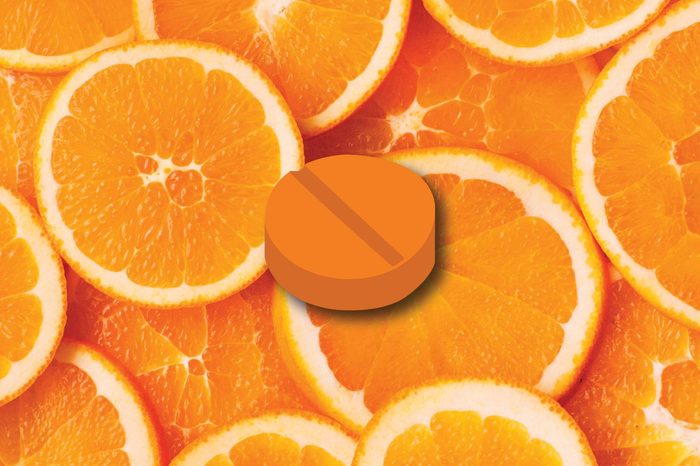
Vitamin C
“Studies have shown a significant reduction in anxiety and depression when sufficient levels of C were taken, either by diet or supplements,” says Warren. One small study, published in a 2018 issue of the journal Antioxidants, assessed vitamin C levels among men aged 18-35 years. It noted that “high vitamin C status may be associated with improved overall mood in young adult males.” However, vitamin C is a water-soluble vitamin. Therefore, the body doesn’t store this vitamin. So be sure to take it regularly to ensure regular healthy levels. Doing so may boost your mood and result in a host of other health benefits. She recommends a minimum of 100 mg daily and no more than 2000 mg per day. Any more than that may cause diarrhea.
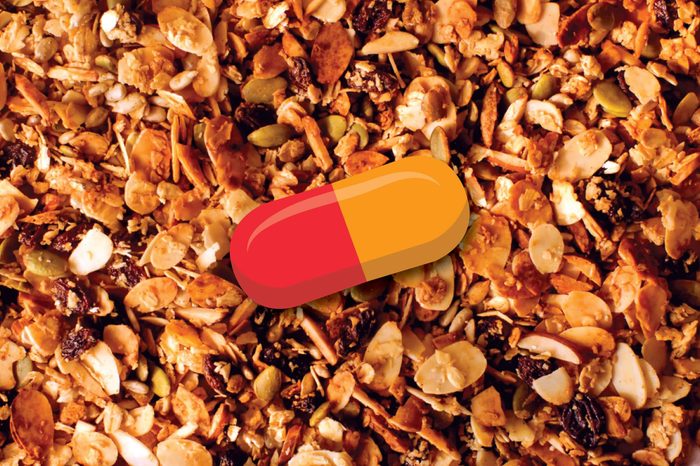
Iron
Some of the biggest signs of an iron deficiency are low energy, chronic fatigue, and mood changes. Do these these common symptoms sound familiar to you? You might be one of the almost 10 percent of women or 2 percent of men who suffer from a deficiency. “The RDA of iron is 18 mg for women of childbearing years and 25 mg for pregnant women, so I like to recommend a supplement that can be split in half or one that is around 9 mg taken twice a day,” says Trattner. “By breaking up iron doses, it keeps bowels moving smoother.” This may help constipation and in turn, boost your mood. Some foods are iron-rich, too. A few include include liver, animal protein, spinach, lentils, some soy foods, and fortified cereals and milks.
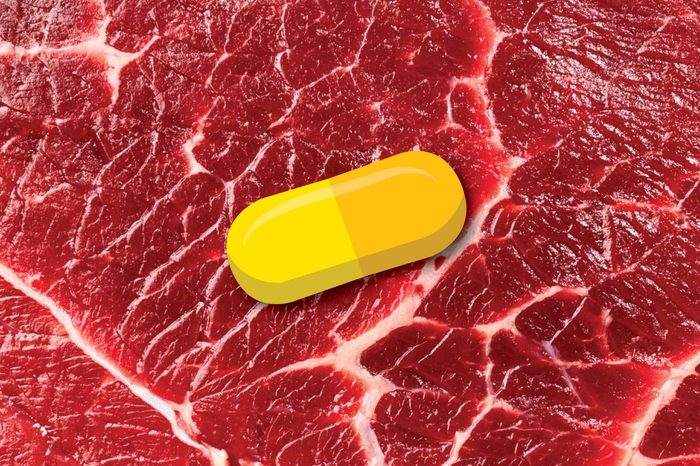
Chromium
Humans require a very small amount of this metallic element, though anywhere from 25 to 50 percent of U.S. adults are mildly deficient in it. “Chromium helps balance our blood sugar level which, in turn, stabilizes our mood,” explains Trattner. “It also helps regulate serotonin, melatonin and other brain chemicals.” If you’re consuming chromium in a supplement, she recommends 200 mcg. However, it’s also in animal protein and potatoes.
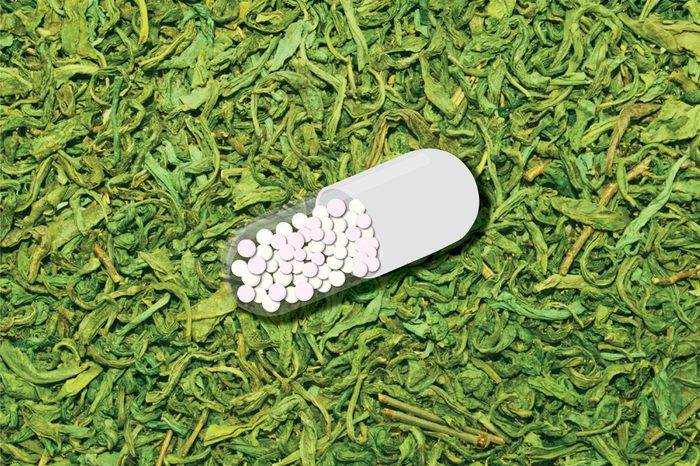
L-theanine
This superstar amino acid may increase serotonin levels and boost alpha waves in the brain, explains Trattner. The easiest way she recommends getting a healthy dose is by drinking matcha, the purest form of green tea known for its high levels of antioxidants and other amazing benefits. “Matcha has one of the highest ORAC ratings in the plant kingdom and is a whole vegetal drink as opposed to green tea which is fermented leaves,” she says. “One cup of good organic matcha can have you feeling great immediately.” ORAC stands for “Oxygen Radical Absorbance Capacity.” The acronym refers to the antioxidant capacity in different foods. If you have a caffeine sensitivity, avoid matcha and drink decaffeinated green tea instead.
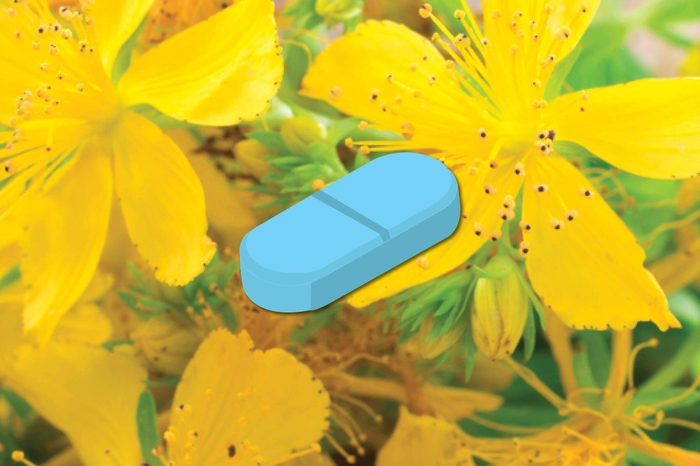
St. John’s wort
According to Daniel Kellman, a naturopathic doctor and the director of Naturopathic Support and Rehabilitation Services at Cancer Treatment Centers of America (CTCA) in Atlanta, GA, St. John’s Wort is one of the most popular natural antidepressants. “Its mechanism mirrors the action of pharmaceutical antidepressants like SSRI’s (think Prozac and Paxil) and some evidence shows it to be effective, while other studies don’t show benefit,” he says. “While St. John’s Wort may be effective in some individuals, it also can have similar side effects of conventional drug therapy.” Be sure to speak to your physician before taking it. It may cause issues when taken in conjunction with blood thinners, cholesterol medicines, and many other prescription drugs.
